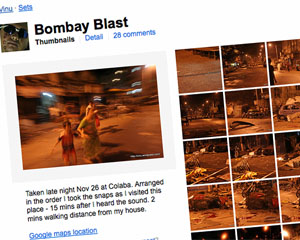Some interesting lessons learnt by the BBC News website from last week’s coverage of the terrorist attacks in Mumbai, according to a blog post by editor Steve Herrmann.
The site used Tweets which seemed to be reports from Mumbai as part of its live updates page, which also featured news updates and excerpts from correspondents and blogs.
This page has a specific role, explains Herrmann in the post, to provide ‘a running account, where we are making quick judgments on and selecting what look like the most relevant and informative bits of information as they come in’, prior to making more considered reports for the main news items and bulletins.
“These accounts move more quickly and include a wider array of perspectives and sources, not all verified by us, but all attributed, so that in effect we leave some of the weighing up of each bit of information and context to you.”
Referring to one particular tweet about the Indian government attempting to clamp down on Twitter, which many tried to verify at the time, Herrmann asks whether this – and other potentially unverified items – should have been included in the coverage.
Not if it’s not attributed and not if it’s going to appear in a main news item, he says:
“In one sense, the very fact that this report was circulating online was one small detail of the story that day. But should we have tried to check it and then reported back later, if only to say that we hadn’t found any confirmation? I think in this case we should have, and we’ve learned a lesson. The truth is, we’re still finding out how best to process and relay such information in a fast-moving account like this.”
There is an argument for including such reports, whether they come in by Twitter, email or photograph, as means of passing on the information to readers as quickly as possible ‘on the basis that many people will want to know what we know and what we are still finding out, as soon as we can tell them’.
It is clear that with every major news event the site is experimenting and developing its newsgathering and reporting strategy, showing just how flexible and online news organisation needs to be to serve its users at times of breaking news.
